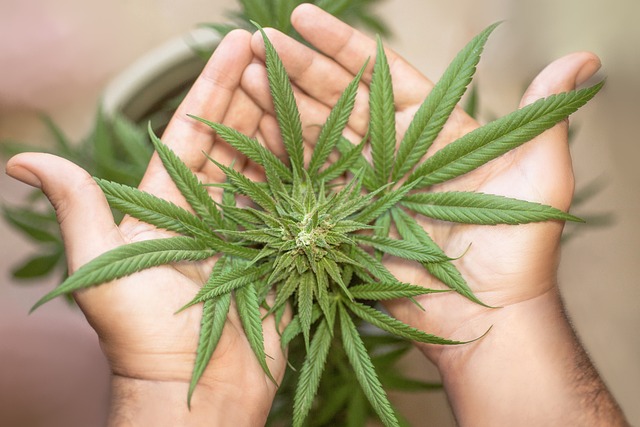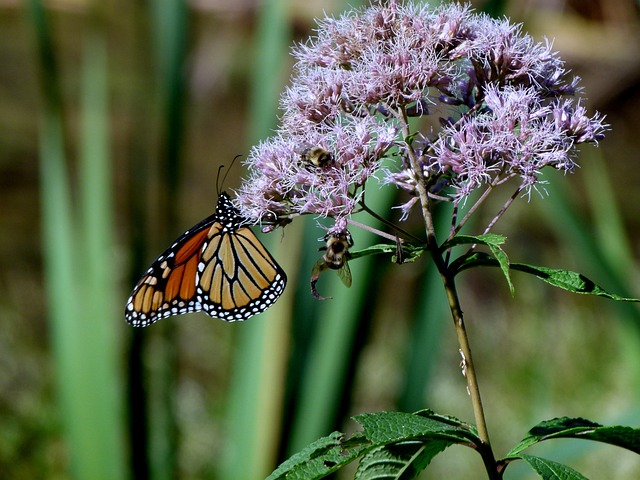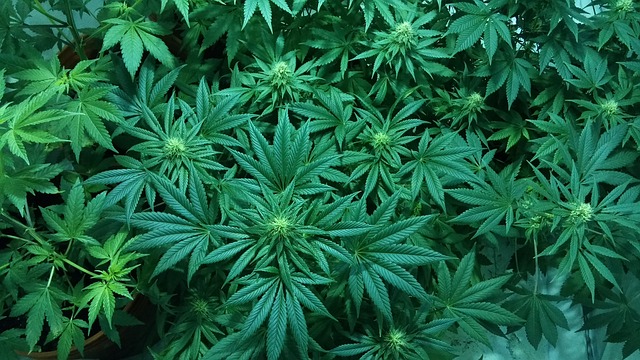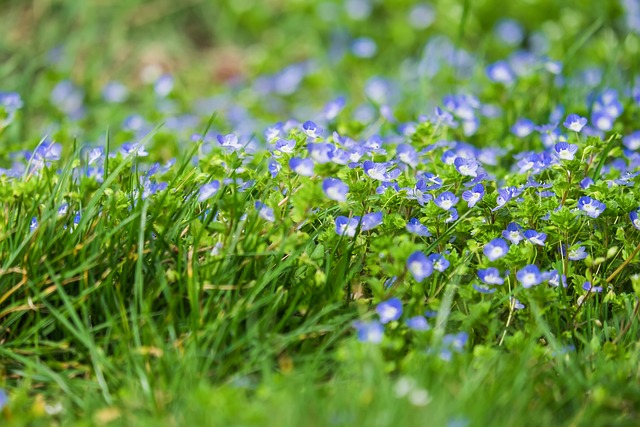The THCA flower, a non-psychoactive compound from cannabis plants, is being studied for its potential therapeutic effects on the immune system. Unlike its psychoactive counterpart THC, THCA interacts with the endocannabinoid system by binding primarily to CB2 receptors, which are key to regulating immune responses. Preliminary research suggests that THCA may modulate immune activity by influencing cytokine production and inhibiting inflammatory cytokines like TNF-alpha and interleukin-6. The presence of anti-inflammatory terpenes such as beta-caryophyllene adds to its potential benefits for conditions involving chronic inflammation. The THCA flower's diverse composition, including a range of cannabinoids, terpenes, and flavonoids, contributes to its immune system support qualities. As the understanding of its effects grows, THCA flower is increasingly recognized as a promising natural solution for immune support without psychoactive side effects. Users interested in exploring its benefits should consult healthcare professionals and consider strain selection for optimal therapeutic outcomes. Ongoing research aims to further elucidate the immunomodulatory properties of THCA flower and its role in wellness routines.
Explore the multifaceted world of THCA (Tetrahydrocannabinolic Acid) flower and its significant role in bolstering immune system health. This article delves into the science behind how this natural compound interacts with the body’s defenses, shedding light on its composition, effects across various strains, and how it can be seamlessly integrated into a wellness routine for enhanced immune support. Gain expert insights from leading research to understand the full scope of THCA flower’s potential benefits for your health. Join us as we unravel the mysteries of this promising cannabinoid.
- Unveiling the Potential of THCA Flower and Its Impact on Immune System Health
- The Science Behind THCA: How Cannabinoids Interact with the Body's Defenses
- Understanding THCA Flower: Composition, Effects, and Varieties
- Incorporating THCA Flower into Your Wellness Routine for Immune Support
- Expert Insights: What Research Says About THCA Flower and Immune System Function
Unveiling the Potential of THCA Flower and Its Impact on Immune System Health

THCA flower, or tetrahydrocannabinolic acid flower, represents a promising area of research in the field of natural compounds affecting immune system health. Unlike its more famous counterpart THC, THCA is non-psychoactive, making it an attractive option for those seeking potential therapeutic benefits without the psychotropic effects. Preliminary studies suggest that THCA interacts with the body’s endocannabinoid system, which plays a crucial role in regulating various physiological processes, including immune responses. The unique cannabinoids found within THCA flower, such as THCA itself and other cannabinoids like CBDA, may have immunomodulatory properties, meaning they could potentially both bolster the immune system against pathogens and modulate overactive immune responses associated with certain diseases.
The potential of THCA flower for immune system health is further underscored by its rich profile of terpenes and flavonoids, which may work synergistically with cannabinoids to enhance immune function. For instance, the terpene beta-caryophyllene has been shown to interact with the body’s CB2 receptors, potentially offering anti-inflammatory benefits that could be beneficial for conditions like arthritis and inflammatory bowel disease. As research continues to evolve, the understanding of how THCA flower can influence immune system responses is likely to expand, offering new insights into its potential role in maintaining and supporting overall health. Users interested in exploring the effects of THCA flower on their immune system should consult with healthcare professionals to ensure safe and responsible use, especially considering individual differences in response to cannabinoids.
The Science Behind THCA: How Cannabinoids Interact with the Body's Defenses

Delta-9-tetrahydrocannabinolic acid, commonly known as THCA, is the non-psychoactive precursor to the well-known psychoactive compound delta-9-THC found in cannabis. The thca flower, rich in this cannabinoid, has garnered attention for its potential therapeutic properties, particularly concerning the immune system. Scientific studies indicate that THCA interacts with the body’s endocannabinoid system (ECS), a complex cell-signaling system identified as a key regulator of physiology and homeostasis. The ECS comprises three main components: endocannabinoids, receptors, and enzymes that produce and break down cannabinoids. THCA binds primarily to the CB2 receptors, which are abundantly expressed on immune cells. This binding can influence the immune response by modulating cytokine production and the activity of immune cells such as macrophages and lymphocytes. The anti-inflammatory effects of THCA suggest a potential role in bolstering the body’s defenses against pathogens and inflammation, making thca flower an intriguing subject for those interested in natural approaches to immune system support.
Furthermore, research has shown that THCA may exert its effects through various molecular pathways. It can inhibit the production of pro-inflammatory cytokines like TNF-alpha and interleukin-6, which are often elevated in immune-related disorders. This downregulation of inflammation is critical in conditions where chronic inflammation plays a role, such as autoimmune diseases or certain cancers. The thca flower’s potential to modulate the immune system without psychoactive effects makes it a compelling subject for further investigation and exploration within scientific and therapeutic contexts.
Understanding THCA Flower: Composition, Effects, and Varieties

THCA, or Tetrahydrocannabinolic Acid, is a non-psychoactive cannabinoid found abundantly in raw cannabis plants, including the popular THCA flower. As the precursor to THC, it undergoes decarboxylation when heated, transforming into the well-known psychoactive compound THC. THCA flower, rich in this cannabinoid, has garnered attention for its potential therapeutic properties, particularly for immune system support. Unlike its activated form, THC, THCA interacts with the body’s endocannabinoid system without the psychoactive effects, making it a preferred choice for those seeking the health benefits of cannabis without impairment.
The composition of THCA flower is complex, with THCA being just one of the many cannabinoids present. It also contains a variety of terpenes and flavonoids that contribute to its unique aroma and taste profiles. These compounds work synergistically, potentially enhancing the immune-boosting effects of THCA. For instance, the terpene beta-caryophyllene has been shown to have anti-inflammatory properties and may help modulate the immune response. Additionally, the variety of THCA flowers available is vast, each offering different ratios of cannabinoids and terpenes that can influence effects and benefits. When selecting a THCA flower for immune system support, it’s important to consider the specific strain and its cannabinoid and terpene composition, as this will dictate its potential therapeutic properties. Users often report a sense of well-being and vitality when consuming THCA flowers, attributing these effects to their interaction with the endocannabinoid system, which plays a crucial role in regulating immune function and maintaining homeostasis within the body.
Incorporating THCA Flower into Your Wellness Routine for Immune Support

Integrating THCA flower into your wellness routine can offer potential immune support benefits. Tetrahydrocannabinolic acid (THCA), which is the raw, non-psychoactive form of THC found in cannabis plants, has been studied for its possible role in bolstering the body’s natural defenses. While the scientific community continues to explore its mechanisms, preliminary research suggests that THCA flower may interact with the body’s endocannabinoid system, influencing immune response regulation. This non-intoxicating compound is often found in high concentrations in certain hemp strains and can be consumed through various methods such as smoking, vaporizing, or infusing into edibles.
For those interested in exploring THCA flower for its potential immune-supportive properties, it’s important to approach its use thoughtfully. Incorporating THCA flower into a wellness routine should be done with consideration of your overall health and any advice from healthcare professionals. Regular consumption of THCA flower may help modulate the body’s immune function, which could be particularly beneficial during times when immune support is crucial. It’s also worth mentioning that THCA flower can be a versatile addition to your wellness regimen, offering a range of potential health benefits beyond immune support, including stress relief and pain management. As with any supplement or wellness practice, consistency and the right dosage are key to experiencing the full spectrum of its effects.
Expert Insights: What Research Says About THCA Flower and Immune System Function

Laboratory studies have indicated that THCA, or tetrahydrocannabinolic acid, the raw form of THC found in cannabis plants, may hold potential immune-modulating properties. Research suggests that THCA interacts with the body’s endocannabinoid system through its receptors, potentially influencing immune responses. For instance, studies have shown that THCA can modulate cytokine production, which are key signaling molecules in the immune system, helping to regulate inflammation and immune cell activity. This modulatory role could be beneficial in conditions where either excessive or insufficient immune responses are present. However, it’s important to note that while these findings are promising, human clinical trials are necessary to fully understand the implications of THCA flower on immune system function and to assess its safety and efficacy.
Furthermore, expert insights highlight the need for further research to elucidate the mechanisms by which THCA flower influences the body’s immunological responses. Preclinical models have provided a foundation for understanding this relationship, yet human trials are essential to validate these effects and guide potential therapeutic applications. The potential of THCA flower for immune system support is an area of growing scientific interest, with ongoing studies aiming to uncover more about its immunomodulatory properties and how it might be utilized in various health contexts. As the body of research expands, so too does the understanding of how this cannabinoid could play a role in supporting immune system balance and function.
THCA flower, with its unique composition and multifaceted effects on the body’s defense mechanisms, has emerged as a notable component in wellness routines aiming to bolster immune system health. The scientific community continues to uncover the intricate ways in which cannabinoids like THCA interact with our bodies, offering promising insights into their potential benefits. As we integrate THCA flower into our health regimens, it’s clear that this natural substance holds significant promise for those seeking to support and maintain robust immune system function. The collective findings from expert research underscore the importance of considering THCA flower as a part of holistic wellness strategies.
